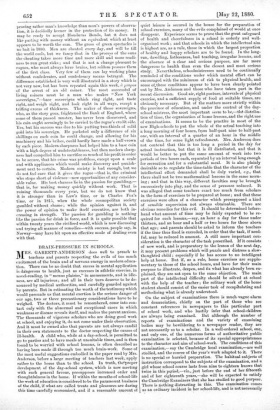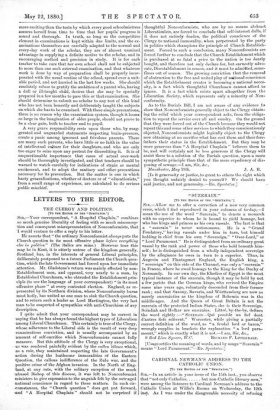BRAIN-PRESSURE IN SCHOOLS.
NERS. GARRETT-ANDERSON does well to preach to 1 teachers and parents respecting the evils of too much excitement of the brain and of nervous energy in modern educa- tion. There can be no doubt that excess in mental application is dangerous to health, just as excesses in athletic exercise, in novel-reading, in "menus plaisirs," in amusements, and in idle- ness, are all injurious; and all in their turn deserve to be de- nounced by medical authorities, and carefully guarded against by parents. But in estimating the worth of the testimony which would persuade us that mental exertion is the serious danger of our age, two or three precautionary considerations have to be weighed. The doctors, it must be remembered, come into con- tact only with the abnormal and exceptional cases in which. weakness or disease reveals itself, and makes the parent anxious. The thousands of vigorous scholars who are doing good work at school, and enjoying it, do not come under their observation. And it must be owned also that parents are not always candid in their own statements to the doctor respecting the causes of ill-health. A child who, while at a day-school, is permitted to go to parties and to have meals at unsuitable times, and is then found to be worried with school lessons, is often described as having been made ill through too much brain-work. Some of the most useful suggestions embodied in the paper read by Mrs. Anderson, before a large meeting of teachers last week, apply rather to the home than to the school. In truth, thelproper development of the day-school system, which is now meeting with such general favour, presupposes increased order and thoughtfulness in the home. If within the months of school-life the work of education is considered to be the paramount business of the child, if what are called treats and pleasures are during Ws time carefully economised, and if a reasonable amount of quiet leisure is secured in the house for the preparation of school exercises, many of the evils complained of would at once disappear. Experience seems to prove that the great safeguard of health and cheerfulness in a school is orderly and well- organised work ; and that schools in which the intellectual aim is highest are, as a rule, those in which the largest proportion of healthy and happy scholars are to be found. In the long- run, dawdling, listlessness, bad teaching, irregular lessons, and the absence of a clear and serious purpose, are far more dangerous to health than even the closest and most serious study. Nevertheless, schoolmistresses need to be continually reminded of the conditions under which mental effort can be encouraged with the minimum of risk to physical health, and some of.these conditions appear to have been clearly pointed out by Mrs. Anderson and those who have taken part in the- recent discussion. Good air, right posture, intervals of physical exercise, and a sufficient supply of food at suitable times, are obviously necessary. But of the matters more strictly within the province of education, and under the control of the day- school mistress, the most important seem to be,—the distribu- tion of time, the organisation of home lessons, and the right use of examinations. It seems to be the practite in most of the new High-schools to put the whole of the actual teaching into a long morning of four hours, from half-past nine to half-past one, with an interval ol a quarter of an hour in the middle of the time, for some light refreshment. Mrs. Anderson does not contend that this is too long a period in the day for actual instruction, but that it is ill distributed, and that it would be better to put the same amount of work into two periods of two hours each, separated by an interval long enough for recreation and for a substantial meal. It is also plainly desirable so to regulate the time-table that the character of the intellectual effort demanded shall be duly varied, e.g., that there shall not be two mathematical lessons in the same morn- ing; and that in this way, different faculties may be brought successively into play, and the sense of pressure reduced. It was alleged that some teachers exact too much from scholars in the form of exercises to be prepared at home; and that these exercises were often of a character which presupposed a kind of sensible supervision not always obtainable. There are obvious remedies for this evil. It should be determined before- hand what amount of time may be fairly expected to be re- quired for such lessons,—say, an hour a day for those under thirteen, and an hour and a half or two hours for those above that age; and parents should be asked to inform the teachers if the time thus fixed is exceeded, in order that the task, if need- ful, may be reduced in amount. A still more important con- sideration is the character of the task prescribed. If it consists of new work, and is preparatory to the lesson of the next day, it may present problems which will puzzle and distress a slow- thoughted child ; especially if he has access to no intelligent help at home. But if, as a rule, home exercises are supple- mentary to those of the school hours, and have for their main purpose to illustrate, deepen, and fix what has already been ex- plained, they are not open to the same objection. The main part of the intellectual difficulty should be solved at school with the help of the teacher ; the solitary work of the home student should consist of the easier task of recapitulating and methodising what is already understood.
On the subject of examinations there is much vague alarm and denunciation, chiefly on the part of those who see constant references in newspapers to this particular part of school work, and who hastily infer that school-children are always being examined. But although the number of reports of examinations and the variety of examining bodies may be bewildering to a newspaper reader, they are not necessarily so to a scholar. In a well-ordered school, one, and only one, of the numerous forms of authoritative public examination is selected, because of its special appropriateness to the character and aim of school-work. The conditions of this examination,— say the Cambridge local examination,—are well studied, and the course of the year's work adapted to it. There is no special or hurried preparation. The habitual subjects of instruction correspond to the subjects of the examination, and a girl whose school course lasts from nine to eighteen knows that twine in this period,—viz., just before the end of her fifteenth and of her eighteenth years,—she will be expected to satisfy the Cambridge Examiners that she has studied to good purpose. There is nothing distracting in this. The examination comes as an ordinary incident in her school-life, and is not necessarily more exciting than the tests by which every good schoolmistress assures herself from time to time that her pupils' progress is sound and thorough. In truth, so -long as the competitive element in examinations is kept within due limits, and the ex- aminations themselves are carefully adapted to the normal and every-day work of the scholar, they are of almost unmixed. advantage in supplying a definite motive to the scholar, and in encouraging method and precision in study. It is for each teacher to take care that her own school shall not be subjected to more than one such external examination, and that whatever work is done by way of preparation shall be properly incor- porated with the usual routine of the school, spread over a suit- able period, and not hurried in the last few weeks. She should resolutely refuse to gratify the ambition of a parent who, having a dull or ill-taught child, desires that she may be specially prepared in a few Months to pass this or that examination. She should determine to submit no scholar to any test of this kind who has not been honestly and deliberately taught the subjects on which she has to be examined. With these simple precautions, there is no reason why the examination system, though it looms so large in the imagination of older people, should not prove to be a clear gain, both to teacher and to pupil.
A very grave responsibility rests upon those who, by exag- gerated and unguarded statements respecting brain-pressure, .create a panic among ignorant and frivolous parents. There are many such parents, who have little or no faith in the value .of intellectual culture for their daughters, and who are only too eager to seize upon any pretext for discrediting it. It is of unquestionable importance that cases of actual over-work should be thoroughly investigated, and that teachers should be warned to watch carefully for indications of strain or mental excitement, and to adopt the sanitary and other precautions _necessary for its prevention. But the matter is one in which hasty generalisations, whether of doctors or of "educationists," from a small range of experience, are calculated to do serious public mischief.



































 Previous page
Previous page